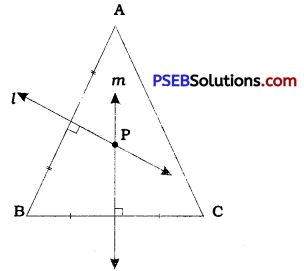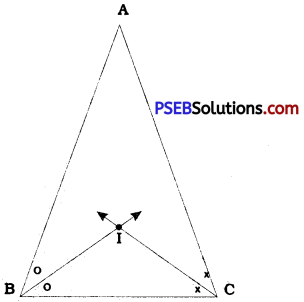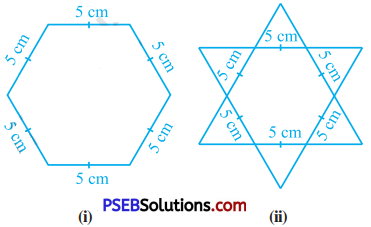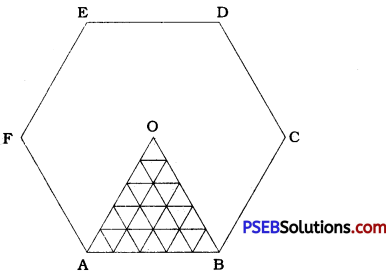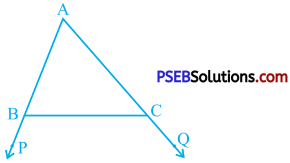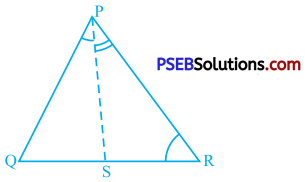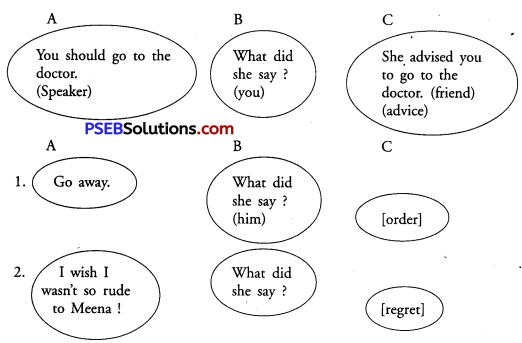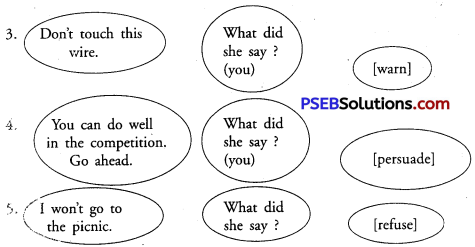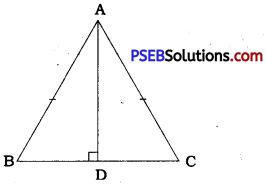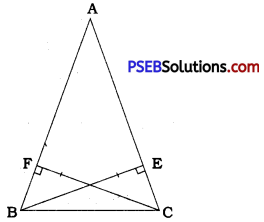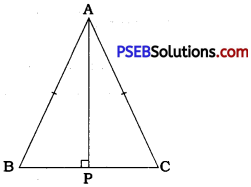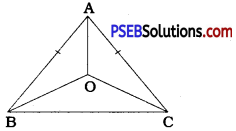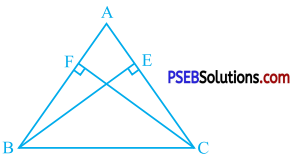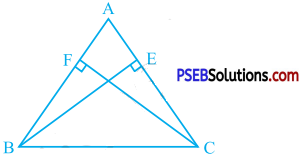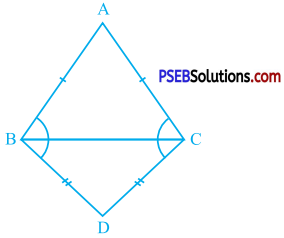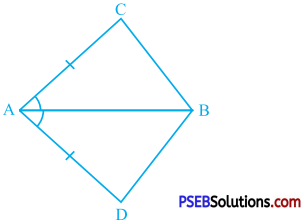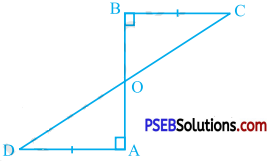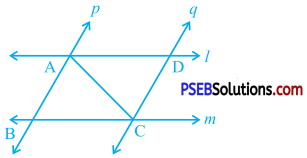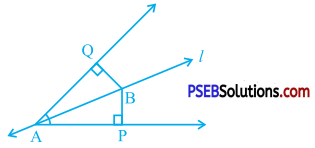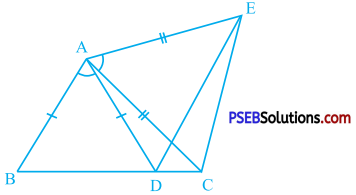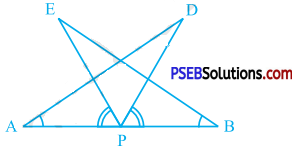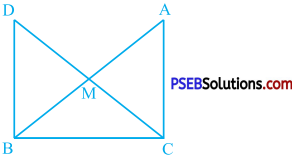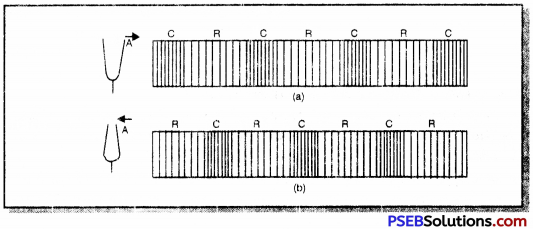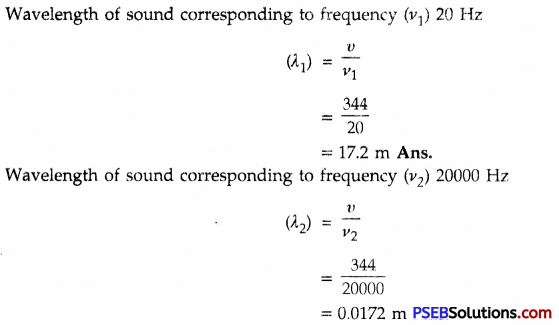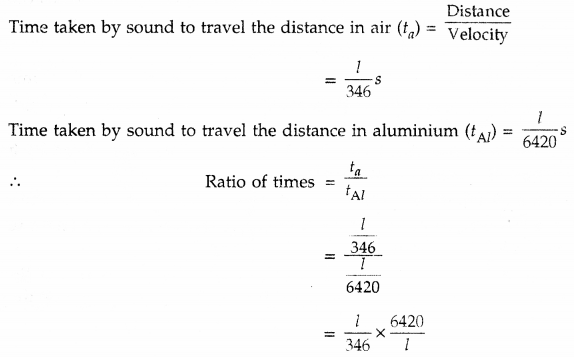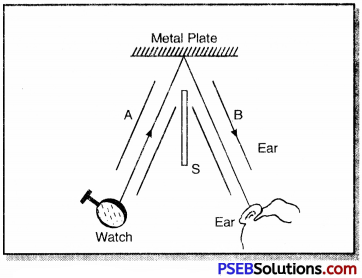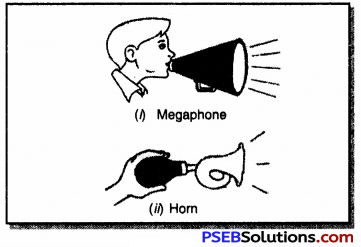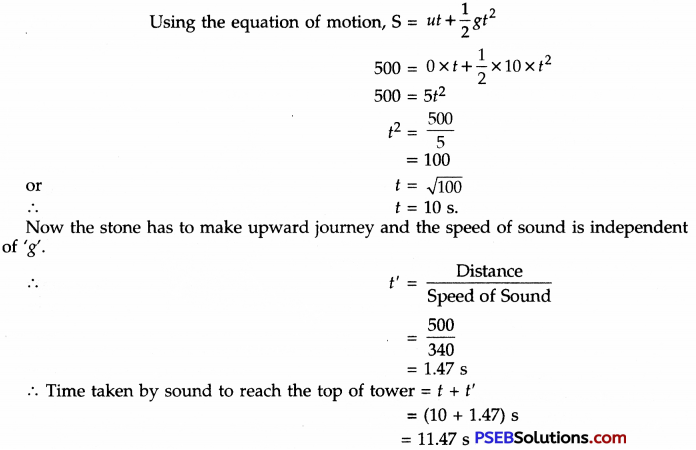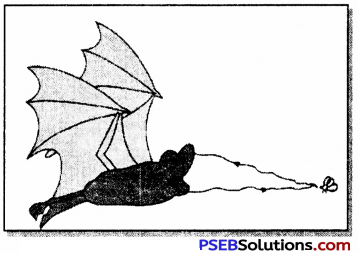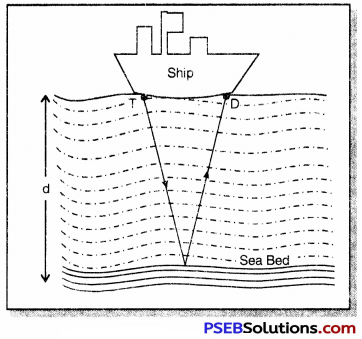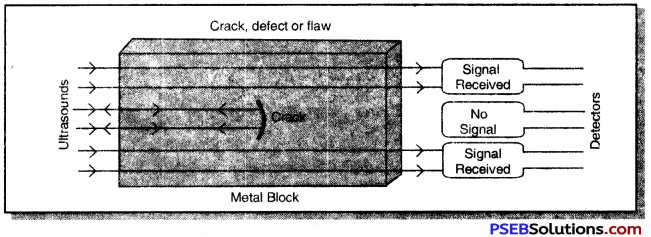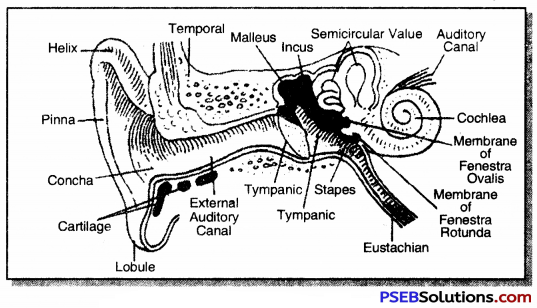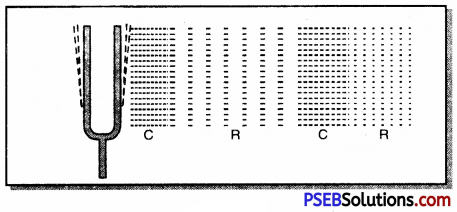Punjab State Board PSEB 9th Class English Book Solutions English Grammar Voice Exercise Questions and Answers, Notes.
PSEB 9th Class English Grammar Voice
Change the voice in the following sentences :
1. Sita writes a letter.
2. He killed the lion.
3. They will help you.
4. He was eating an orange.
5. The nurse is looking after the patient.
6. I have completed my work.
7. I had learnt my lesson.
8. His enemies have defeated him.
Answer:
1. A letter is written by Sita.
2. The lion was killed by him.
3. You will be helped by them.
4. An orange was being eaten by him.
5. The patient is being looked after by the nurse.
6. My work has been completed (by me).
7. My lesson had been learnt (by me).
8. He has been defeated by his enemies.

Complete the passage with either the active or passive forms of the verbs given in the box :
block, press, blow, cause, live, sweep, cut, rescue.
Damage worth millions of rupees (a) ……………… by a storm which (b) ……………. across coastal areas of Orissa. The army (c) …………… into service. Many people (d) ……………… from the floods by the army. Winds ………….. (e) at the speed of about 150 kms. an hour in some places. Roads (f) …………… by fallen trees. Electricity lines (g) ……….. and people had to (h) …………. without electricity for several hours.
Answer:
(a) was caused
(b) swept
(c) was pressed
(d) were rescued
(e) were blowing
(f) were blocked
(g) were cut
(h) live.
Change the voice of the following passage :
Raju killed a snake with a stick. He threw it into a pond nearby. He played cricket for some time. Then he plucked some flowers to make garlands. He put the garland on Lord Krishna’s statue.
Answer:
A snake was killed with a stick by Raju. It was thrown by him into a pond nearby. Cricket was played by him for some time. Then some flowers were plucked by him to make garlands. The garland was put on Lord Krishna’s statue by him.
Look at some newspaper headlines given below. Then use the information in the headlines to complete the sentences that follow (select the proper form of the verb to be used) :
(a) Three Passengers Crushed
………………. to death when they fell from the rooftop of a bus.
(b) Fifty Huts Destroyed In Fire
A fire broke out in a resettlement colony in which ………….
(c) Leopard Beaten To Death
The police report that a …………… by villagers when it tried to attack them.
(d) Suspect Arrested
London police report that a suspect involved in the Bomb Blast Case …..
(e) Two Stabbed
It is learnt that …………………….. in two separate incidents yesterday.

(f) Indians To Pay More For Pak Citizenship.
Indians applying for Pakistani citizenship will ……………
Answer:
(a) Three passengers were crushed
(b) fifty huts were destroyed.
(c) leopard was beaten to death
(d) has been arrested.
(e) two men were stabbed
(f) have to pay more.
The passive voice can be used in several tenses. Complete the following table, filling up the blanks with suitable form of the verbs :
| Tenses Subject |
Verb ‘to be’ |
Past participle |
| 1. (Future Indefinite) |
Lunch |
………….. taken at 1 p.m here. |
| 2. (Past Continuous) |
The house |
………….. built. |
| 3. (Present Perfect) |
The lost purse |
………….. found. |
| 4. (Past Simple) |
The culprit |
……….. produced in the court. |
| 5. (Past Continuous) |
The door |
……….. repaired |
| 6. (Past Perfect) |
A suitable action |
………… taken |
| 7. (Past Indefinite) |
My proposal |
……… accepted |
| 8. (Past Perfect) |
Letters |
………. posted |
Answer:
1. will be
2. was being
3. has been
4. was
5. was being
6. had been
7. was
8. had been.
Complete the following sentences, using the correct form of the verb in the brackets :
1. This historical monument ………… (build) thousands of years ago.
2. The money …………… (steal) by Mr. Gupta’s servant yesterday.
3. The largest 9-way flyover ………….. (construct) last month in Delhi.
4. Seema’s marriage outfit …………. (design) by the famous designer Ritu Beri. (Present Perfect)
5. A letter ………….. (receive) by Mohan 10 days after it ………….. (post).
Answer:
1. was built
2. was stolen
3. was constructed
4. has been designed
5. was received, had been posted.

In the sentences given below, change the verb into passive form:
1. Robbers raided the bank.
2. The terrorists injured ten people.
3. They took away all the cash.
4. They also shot the security guards.
5. The police have arrested the thieves.
Answer:
1. The bank was raided by robbers.
2. Ten people were injured by the terrorists.
3. All the cash was taken away by them.
4. The security guards were also shot by them.
5. The thieves have been arrested by the police.
Using the outline given in the box, fill in the blanks in the passage below :
New school on the outskirts of Delhi. Is located in Tijara (90 km drive from Delhi). The brain child of legal expert, Vidya Sagar. Uniform syllabus. Yearly boarding and tuition expenses believed to be around 1.25 lacs.
There is a new school (a) …………………….. of Delhi. It (b) …………. in Tijara, 90 kms. from Delhi. It is the brainchild of legal expert Vidya Sagar. (c) ………….. introduced in this school. It (d) …………. that yearly boarding and tuition expenses would be around 1.25 lacs.
Answer:
(a) on the outskirts
(b) is located
(c) Uniform syllabus is
(d) is believed.
Read the following set of instructions and fill in the blanks :
How To Make Tea
(i) Take a kettle.
(ii) Put half a cup of water in it.
(iii) Put it on the gas stove.
(iv) Switch on the stove.
(v) When the water begins to boil, add a teaspoonful of tea-leaves
(vi) Add half a cup of milk and some sugar to it.
(vii) Switch off the stove when the mixture starts boiling.
(viii) Pour the mixture into a cup through a sieve (sifter).
A kettle was taken. Half a cup of water (a) …………. in it. It (b) ………… on the gas stove. The stove (c) ………… When the water began to boil, a teaspoonful of tea leaves (d) ………….. to it. Half a cup of milk and some sugar (e) ………….. to the mixture. The stove (f) ……… when the mixture started boiling. It was (g) ………… a cup through a sieve.
Answer:
(a) was put
(b) was put
(c) was switched on
(d) was added
(e) were added
(f) was switched off
(g) poured into.
Complete the passage with either the active or passive form of the verbs given in the box :
hit , admit, arrest, registed.
A Ludhiana BJP leader, Radhey Shyam (a) ………. by a truck near Patna bus depot last night. Radhey Shyam (b) ……… to a hospital in the city. The truck driver Hari Singh (c) ……… by the police. A case of causing death due to rash and negligent driving (d) ………… against him.
Answer:
(a) was hit
(b) was admitted
(c) was arrested
(d) was registered.

Change the Voice in the following passage :
A truck hit a bus yesterday. The carelessness of the driver caused the accident. The local people took the injured passengers to hospital. The police have arrested the driver.
Answer:
A bus was hit by a truck yesterday. The accident was caused by the carelessness of the driver. The injured passengers were taken to hospital by the local people. The driver has been arrested by the police.
Change the Voice in the following passage :
We saw a magic show yesterday. The magician showed a number of wonderful tricks. First, he took off his hat and put it on the table. He covered the hat with a piece of cloth. Then he moved a stick over the hat. He then took the cloth off. Out of the hat, he pulled out three chickens.
Answer:
A magic show was seen by us yesterday. A number of wonderful tricks were shown by the magician. First his hat was taken off by him and was put on the table. The hat was covered by him with a piece of cloth. Then a stick was moved by him over the hat. The cloth was then taken off by him. Out of the hat three chickens were pulled out by him.
Complete the passage with the Passive form of the verbs given in the box :
dig select prepare lower cover sprinkle
First, a plant (a) ………… Then a hole (b) ……….. where the plant was to be placed into the soil. The soil (c) ……….. by mixing manure in it. The plant (d) ………. into the hole carefully. The roots were (e) ……….. with the prepared soil. Some, water (f) ……… on the plant.
Answer:
(a) was selected
(b) was dug
(c) was prepared
(d) was lowered
(e) covered
(f) was sprinkled.
Complete the following passage, using the verbs in brackets in the Passive voice :
At least four crore worth of imported newsprint (a) ………. (destroy) in yesterday’s fire in one of the godowns outside Cochin port. The fire which broke out in the afternoon (b) ………. (bring) under control only this morning. Firefighting operations (c) ………. (hamper) by the delay and difficulty in removing the huge newsprint rolls from outside the godown. The godown (d) ………. (hire) for the Hindustan Newsprint by a private ‘dearing and forwarding’ agent. The port operations (e) ………. (affect) due to the incident.
Answer:
(a) was destroyed
(b) could be brought
(c) were hampered
(d) had been hired
(e) were affected.

Read the following set of instructions for the servicing of an air conditioner and complete the paragraph that follows, using passive form of the verbs used :
(i) Dismantle the air conditioner.
(ii) Take out the main machine from inside the box.
(iii) Blow off the entire dust from the body with the help of a vacuum cleaner.
(iv) Wash the body with a spray of water from a pipe.
(v) Let it dry in the sun for about an hour.
(vi) Fix it back into place.
The air conditioner is (a) ………. The main machine is (b) ………. out from inside the box. The entire dust from the body (c) ………. with the help of a vacuum cleaner. The body (d) ……………. with a spray of water from a pipe. It (e) ………. then (f) ………. in the sun for about an hour. It is now (g) ………. back into place.
Answer:
(a) dismantled
(b) taken
(c) is blown off
(d) is washed
(e) should
(f) be dried
(g) fixed.
Change the Voice in the following passage :
Sita is singing a song. She sings film songs as well as folk songs. All like her. She helps the poor with the money she earns. God will certainly bless her. The country needs such artists.
Answers
A song is being sung by Sita. Film songs as well as folk songs are sung by her. She is liked by all. The poor are helped by her with the money earned by her. She will certainly be blessed by God. Such artists are needed by the country.
Change the Voice in the following sentences :
1. The gardener is plucking flowers.
2. The boys are flying kites.
3. He is laughing at the beggar.
4. The peon was ringing the bell.
5. The watchman had already opened the gate.
Answers
1. Flowers are being plucked by the gardener.
2. Kites are being flown by the boys.
3. The beggar is being laughed at by him.
4. The bell was being rung by the peon.
5. The gate had already been opened by the watchman.
Rewrite the following sentences in the notice format, using the Passive Voice : (see example 1)
1. We do not allow cameras inside.
2. We do not allow children below 12 in this show.
3. We book seats here.
4. We require a shop assistant immediately.
5. We do not allow vehicles inside the campus.
Answers
1. Cameras are not allowed inside.
2. Children below 12 are not allowed in this show.
3. Seats are booked here.
4. A shop assistant is required immediately.
5. Vehicles are not allowed inside the campus.
Complete the passage with the Passive form of the verbs given in the brackets :
A three year old girl (a) ……….(rescue) by the police last Tuesday. She (b) ………… (kidnap) by a neighbour for ransom. The mother informed the police about the missing girl. The probe (c) ……… (supervise) by the DSP himself. More than 50 residents (d) ……… (interrogate). Ultimately, Danny, one of the residents of the colony, admitted the crime and disclosed where the girl (e) ………… (hide).
Answer:
(a) was rescued
(b) had been kidnapped
(c) was supervised
(d) were interrogated
(e) was hidden.
Read the newspaper headlines given below and complete the sentences that follow :
1. Rain Kills Over Two Dozen
Kathmandu : About ……….. in the remote villages of north-western
Kalikot district in the rains that hit the area.
2. Largest Discovery Of Dinosaur Eggs
Lerida : More than 100 eggs of dinosaur ………………….. in north-eastern Spain.
3. Pak Defeated By A Big Margin
The Pakistani cricket team ……………….. in the first one dayer by a big margin yesterday. The match ……………. at Lahore in the Gaddafi Stadium.
4. Obama Accorded Warm Welcome
President Barack Obama of USA ……… a warm welcome on his arrival in India this year. He ……. by the Prime Minister himself at the Delhi airport.

5. Underground Tunnel Unearthed
A half-dug underground tunnel ………. by the police personnel inside the jail compound yesterday. The digging ………… by two convicts undergoing life terms in the jail.
6. Cold Wave Claims 37 Lives
The cold wave prevailing in the Punjab for more than a week has worsened further. There ……. a fresh snowfall in the Himalayas. Meanwhile 37 lives ……… so far by the cold wave.
7. Rich Homage Paid To Mahatma Gandhi ; Statue Unveiled
Rich homage to the great Father of the Nation, Mahatma Gandhi,
on the occasion of his birth anniversary, yesterday. A bronze statue of the great visionary on the occasion.
8. D.J. Simpson Acquitted
In the judgement given today by an American court, the famous football legend D.J. Simpson ………. of murder charges against him.
9. Idols Immersed In River
The ten-day Dussehra festival comes to an end today when all the idols carried in a procession ……….. in the Ganga by the devotees.
10. Three Militants Killed, Seven Arrested
During the past 24 hours, three militants ………….. and seven have been arrested in the Kashmir Valley. A large number of weapons were also seized from those arrested.
11. Afghan Forces Capture Kabul Airport
After a five-day bloody battle, the Kabul Airport ……….. by the Afghan forces early today. Dozens of people were killed and more than 2500 were injured.
12. Govt. To Take Stern Steps
It has been announced by the government that ……….. to check the black-marketing and adulteration of essential goods.
13. Fire Destroys Goods Worth ₹ 25 Lac ; Cause Unknown
Goods ……… when two houses in Tilak Nagar caught fire yesterday. The cause of fire which rendered four families homeless, could not be known.
14. 193 Kg heroin seized :
In the biggest ever drug haul in the country, a consignment of 193 kg of heroin ………. by the Mumbai police from a luxury apartment, in Central Mumbai.
15. Tourists, Attacked By Shark
Last Monday several Australian tourists while surfing off Pasiraman beach.
16. Suspect Arrested
Shahpur police report that the suspect in the Nasir Khan murder case
17. Woman, Child Killed In Road Mishap — Six Injured
A woman and ……….. on the spot and six persons were injured, two of them seriously, when a tempo in which they were travelling, fell into a khud near Lalpani.
18. Bankmen Give Free Hawai Chappals For Lepers
Lepers, living in the Asha Deep Colony of the city, ……… on Thursday by the employees of State Bank of India. The Bankmen were celebrating the 42nd anniversary of their branch.

19. Shopkeeper Arrested, Fined :
Ashok Kumar, a shopkeeper of Bilaspur …………. by the police on Tuesday for selling adulterated atta. Later he was produced before the Chief Judicial Magistrate by whom he ………….. ₹ 5000.
20. Advani Relieved Of His Post :
The BJP President, L.K. Advani, ……… of his post today after he submitted his resignation in the meeting of the general body of the party.
Answer:
1. two dozen men are killed
2. have been discovered
3. was defeated; was played
4. was accorded; was received
5. was unearthed; had been done.
6. has been ; have been claimed.
7. was paid; was unveiled
8. was acquitted
9. are immersed
10. have been killed
11. was captured
12. stem steps will be taken
13. worth 25 lac were destroyed
14. has been seized
15. were attacked by shark
16. has been arrested
17. a child were killed
18. were given free Hawai chappals
19. was arrested ; was fined
20. was relieved.
Rewrite the following passages after changing the Voice :
Question 1.
The early men thought that every misfortune was caused by angry gods. They saw imaginary gods everywhere. They thought of God as a very irritable person who was always losing his temper. If due to some disaster, a large number of people were killed, they would think they had displeased God.
Answer
It was thought by the early men that angry gods cause every misfortune. Imaginary gods were seen everywhere by them. God was thought of by them as a very irritable person who was always losing his temper. If some disaster killed a large number of people, they would think God had been displeased by them.

Question 2.
Mr. Lai teaches us English. He was awarded Padma Shri by the President. He is one of the most dedicated teachers we have. Social work interests Mr. Lai very much. He loves his students as he loves his own children. We are lucky to be his pupils. May God bless him !
Answer
We are taught English by Mr. Lai. The President awarded him Padma Shri. He is one of the most dedicated teachers we have. Mr. Lai is very much interested in social work. His students are loved by him as his own children. We are lucky to be his pupils. May he be blessed by God !
Question 3.
A dove saw a bee fallen in a water tank. It dropped a large leaf into the water. The bee climbed on to the leaf and thanked the dove. A hunter took aim at the dove. The bee stung him. He missed his aim. Now the dove thanked the bee.
Answer
A bee fallen in a water tank was seen by a dove. A large leaf was dropped into the water by it. The bee climbed on to the leaf and the dove was thanked by the bee. The dove was taken aim at by a hunter. He was stung by the bee. His aim was missed by him. Now the bee was thanked by the dove.
Question 4.
Once a jester offended the king. The king at once condemned him to death. The jester pleaded for his life but the king refused to alter the sentence. One day, the king visited the prison. He asked the jester to choose his manner of death. The clever jester at once said that he would like to die of old age.
Answer
Once the king was offended by a jester. He was at once condemned to death by the king. The jester pleaded for his life but the king refused to alter the sentence. One day, the prison was visited by the king. The jester was asked to choose his manner of death by the king. It was at once said by the clever jester that he would like to die of old age.
Question 5.
I explained my case to the doctor. I was seated on a chair against the table by him. I held my hat in my right hand and explained my symptoms. He then gave his advice and helped me liberally.
Answer
My case was explained by me to the doctor. He seated me on a chair against the table. My hat was held in my right hand and my symptoms were explained. His advice was then given and I was helped liberally.
Question 6.
The emperor was adorned in his royal robes. He was attended by his courtiers. He was escorted to the seashore. There he was seated upon a high chair. The chair had been placed there for his reception.
Answer:
The emperor adorned himself in royal robes. His courtiers attended him. They escorted him to the seashore. There they seated him upon a high chair. They had placed the chair there for his reception.
Question 7.
If we look into practical life, we will find that fortune is usually on the side of the industrious. The winds and waves favour the best navigators. Lord Clive began his career in India as a clerk. When he ended his career, he had founded the British Empire in the East.
Answer
If practical life is looked into by us, it will be found by us that fortune is usually on the side of the industrious. The best navigators are favoured by the winds and waves. Lord Clive’s career was begun by him in India as a clerk. When his career was ended by him, the British Empire in the East had been founded by him.
Question 8.
A poor Arab saw a spring of sweet water. He had never before tasted such water. He filled his leather bottle from the spring. He wanted to present it to the Khalif. The courtiers desired to taste the precious water but the Khalif forbade them. The Khalif was touched by the Arab’s concern for him. He awarded the poor man.
Answer
A spring of sweet water was seen by a poor Arab. Such water had never been before tasted by him. His leather bottle was filled by him from the spring. He wanted it to be presented to the Khalif. It was desired by the courtiers to taste, the precious water, but they were forbidden by the Khalif. The Arab’s concern for the Khalif touched him. The poor man was awarded by him.

Question 9.
We all know that Columbus discovered America. He was provided with ships and men by the king of Spain. He met with many difficulties on the way. All his fellow men wanted to turn back. But he did not stop till he reached his goal.
Answer
It is known to all of us that America was discovered by Columbus. The king of Spain provided him with ships and men. He met with many difficulties on the way. All his fellow men wanted to turn back. But he did not stop till his goal was reached.
Question 10.
It is nice that you are taking your studies seriously. Please don’t do it at the cost of your health. Those who do brain work, need regular physical exercise. So don’t avoid games. They teach you something which books can never teach, i.e. discipline.
Answer
It is nice that your studies are being taken seriously by you. You are requested not to do it at the cost of your health. Regular physical exercise is needed by those who do brain work. So games should not be avoided. You are taught by them something which can never be taught by the books, i.e. discipline.
Complete the passage with the Passive form of the verbs given in the brackets :
A three year old girl (a) …………………………. (rescue) by the police last Tuesday. She (b) …………… (kidnap) by a neighbour for ransom. The mother informed the police about the missing girl. The probe (c) ………….. (supervise) by the DSP himself. More than 50 residents (d) …………… (interrogate). Ultimately, Danny, one of the residents of the colony, admitted the crime and disclosed where the girl (e) …………. (hide).
Answer:
(a) was rescued
(b) had been kidnapped
(c) was supervised
(d) were interrogated
(e) was hidden.
Read the newspaper headlines given below and complete the sentences that follow :
1. Rain Kills Over Two Dozen
Kathmandu : About ….. in the remote villages of north-western Kalikot district in the rains that hit the area.
2. Largest Discovery Of Dinosaur Eggs
Lerida : More than 100 eggs of dinosaur ………………… in north-eastern Spain.
3. Pak defeated by a big margin
The Pakistani cricket team …………………. in the first one dayer by a big margin yesterday. The match ……………… at Lahore in the Gaddafi Stadium.
4. Obama Accorded Warm Welcome President Barack Obama Of Usa …
a warm welcome on his arrival in india this year. He ………………….. by the prime minister himself at the delhi airport.
5. Underground Tunnel Unearthed
A half-dug underground tunnel …………. by the police personnel inside the jail compound yesterday. The digging ………………. by two convicts undergoing life terms in the jail.
6. Cold Wave Claims 37 Lives
The cold wave prevailing in Punjab for more than a week has worsened further. There ………….. a fresh snowfall in the Himalayas. Meanwhile 37 lives ………………….. so far by the cold wave.
7. Rich Homage Paid To Mahatma Gandhi; Statue Unveiled
Rich homage ………. … to the great father of the nation, mahatma gandhi, on the occasion of his birth anniversary, yesterday. a bronze statue of the great visionary …………………… on the occasion.
8. D.J. Simpson Acquitted
In the judgement given today by an american court, the famous football legend D.J simpson ……………………. of murder charges against him.
9. Idols Immersed In River
The ten-day dussehra festival comes to an end today when all the idols carried in a procession ……………………. in the ganga by the devotees.
10. Three Militants Killed, Seven Arrested
During the past 24 hours, three militants………………. and seven have been arrested in the kashmir valley. A large number of weapons were also seized from those arrested.
11. Afghan Forces Capture Kabul Airport
After a five-day bloody battle, the kabul airport ………… by the afghan forces early today. dozens of people were killed and more than 2500 were injured.
12. Govt. To Take Stern Steps:
It Has been announced by the government that ……………………….. to check the black-marketing and adulteration of essential goods.
13. Fire Destroys Goods Worth ₹ 25 Lac ; Cause Unknown
goods ……………… when two houses in tilak nagar caught fire yesterday.The cause of fire which rendered four families homeless, could not be known.
14. 193 Kg Heroin Seized :
in the biggest ever drug haul in the country, a consignment of 193 kg of heroin ……. by the mumbai police from a luxury apartment, in central mumbai.
15. Tourists, Attacked By Shark
last monday several australian tourists …………….. while surfing off pasiraman beach.
16. Suspect Arrested
shahpur police report that the suspect in the nasir khan murder case …………
17. Woman, Child Killed In Road Mishap — Six Injured
A woman and ………………… on the spot and six persons were injured, two of them seriously, when a tempo in which they were travelling, fell into a khud near Lalpani.
18. “Bankmen Give Free Hawai Chappals
For Lepers Lepers, living in the Asha Deep Colony of the city, ………………… on Thursday by the employees of State Bank of India. The Bankmen were celebrating the 42nd anniversary of their branch.
19. Shopkeeper Arrested, Fined :
ashok kumar, a shopkeeper of bilaspur …………………… by the police on tuesday for selling adulterated atta. later he was produced before the chief judicial magistrate by whom he ………………… ₹ 5000.

20. Advani Relieved Of His Post :
The BJP President, L.K. Advani, ………………….. of his post today after he submitted his resignation in the meeting of the general body of the party.
Answer:
1. two dozen men are killed
2. have been discovered
3. was defeated ; was played
4. was accorded ; was received
5. was unearthed ; had been done.
6. has been ; have been claimed.
7. was paid ; was unveiled
8. was acquitted
9. are immersed
10. have been killed
11. was captured
12. stern steps will be taken
13. worth ₹ 25 lac were destroyed
14. has been seized
15. were attacked by shark
16. has been arrested
17. a child were killed
18. were given free Hawai chappals
19. was arrested ; was fined
20. was relieved.
Rewrite the following passages after changing the Voice :
Question 1.
The early men thought that every misfortune was caused by angry gods. They saw imaginary gods everywhere. They thought of God as a very irritable person who was always losing his temper. If due to some disaster, a large number of people were killed, they would think they had displeased God.
Answer:
It was thought by the early men that angry gods cause every misfortune. Imaginary gods were seen everywhere by them. God was thought of by them as a very irritable person who was always losing his temper. If some disaster killed a large number of people, they would think God had been displeased by them.
Question 2.
Mr. Lal teaches us English. He was awarded Padma Shri by the President. He is one of the most dedicated teachers we have. Social work interests Mr. Lal very much. He loves his students as he loves his own children. We are lucky to be his pupils. May God bless him !
Answer:
We are taught English by Mr. Lal. The President awarded him Padma Shri. He is one of the most dedicated teachers we have. Mr. Lal is very much interested in social work. His students are loved by him as his own children. We are lucky to be his pupils. May he be blessed by God!
Question 3.
A dove saw a bee fallen in a water tank. It dropped a large leaf into the water. The bee climbed on to the leaf and thanked the dove. A hunter took aim at the dove. The bee stung him. He missed his aim. Now the dove thanked the bee.
Answer:
A bee fallen in a water tank was seen by a dove. A large leaf was dropped into the water by it. The bee climbed on to the leaf and the dove was thanked by the bee. The dove was taken aim at by a hunter. He was stung by the bee. His aim was missed by him. Now the bee was thanked by the dove.
Question 4.
Once a jester offended the king. The king at once condemned him to death. The jester pleaded for his life but the king refused to alter the sentence. One day, the king visited the prison. He asked the jester to choose his manner of death. The clever jester at once said that he would like to die of old age.
Answer:
Once the king was offended by a jester. He was at once condemned to death by the king. The jester pleaded for his life but the king refused to alter the sentence. One day, the prison was visited by the king. The jester was asked to choose his manner of death by the king. It was at once said by the clever jester that he would like to die of old age.
Question 5.
I explained my case to the doctor. I was seated on a chair against the table by him. I held my hat in my right hand and explained my symptoms. He then gave his advice and helped me liberally.
Answer:
My case was explained by me to the doctor. He seated me on a chair against the table. My hat was held in my right hand and my symptoms were explained. His advice was then given and I was helped liberally.

Question 6.
The emperor was adorned in his royal robes. He was attended by his courtiers. He was escorted to the seashore. There he was seated upon a high chair. The chair had been placed there for his reception.
Answer:
The emperor adorned himself in royal robes. His courtiers attended him. They escorted him to the seashore. There they seated him upon a high chair. They had placed the chair there for his reception.
Question 7.
If we look into practical life, we will find that fortune is usually on the side of the industrious. The winds and waves favour the best navigators. Lord Clive began his career in India as a clerk. When he ended his career, he had founded the British Empire in the East.
Answer:
If practical life is looked into by us, it will be found by us that fortune is usually on the side of the industrious. The best navigators are favoured by the winds and waves. Lord Clive’s career was begun by him in India as a clerk. When his career was ended by him, the British Empire in the East had been founded by him.
Question 8.
A poor Arab saw a spring of sweet water. He had never before tasted such water. He filled his leather bottle from the spring. He wanted to present it to the Khalif. The courtiers desired to taste the precious water but the Khalif forbade them. The Khalif was touched by the Arab’s concern for him. He awarded the poor man.
Answer:
A spring of sweet water was seen by a poor Arab. Such water had never been before tasted by him. His leather bottle was filled by him from the spring. He wanted it to be presented to the Khalif. It was desired by the courtiers to taste, the precious water, but they were forbidden by the Khalif. The Arab’s concern for the Khalif touched him. The poor man was awarded by him.
Question 9.
We all know that Columbus discovered America. He was provided with ships and men by the king of Spain. He met with many difficulties on the way. All his fellow men wanted to turn back. But he did not stop till he reached his goal.
Answer:
It is known to all of us that America was discovered by Columbus. The king of Spain provided him with ships and men. He met with many difficulties on the way. All his fellow men wanted to turn back. But he did not stop till his goal was reached.
Question 10.
It is nice that you are taking your studies seriously. Please don’t do it at the cost of your health. Those who do brain work, need regular physical exercise. So don’t avoid games. They teach you something which books can never teach, i.e. discipline.
Answer
It is nice that your studies are being taken seriously by you. You are requested not to do it at the cost of your health. Regular physical exercise is needed by those who do brain work. So games should not be avoided. You are taught by them something which can never be taught by the books, i.e. discipline.
Active Voice – जिस वाक्य में Subject का सीधा सम्बन्ध Verb के साथ होता है (अर्थात् कर्ता के अनुसार क्रिया का रूप निर्धारित होता है), उसे Active Voice का वाक्य कहा जाता है।
Passive Voice – जिस वाक्य में कर्म के अनुसार क्रिया का रूप निर्धारित होता है (और कर्ता का क्रिया पर कोई प्रभाव नहीं होता), उसे Passive Voice का वाक्य कहा जाता है।
निम्नलिखित वाक्यों को ध्यान से देखिए :
| Active Voice , |
Passive Voice |
1. Earn writes a letter,
2. Children like sweets. |
1. A letter is written by Ram.
2. Sweets are liked by children |
ऊपर के वाक्यों में हमने देखा कि
(1) Active Voice के वाक्य में जो Subject होता है, वह Passive Voice के वाक्य में Object बन जाता है।
(2) Active Voice के वाक्य में जो Object होता है, वह Passive Voice के वाक्य में Subject बन जाता है।
(3) Passive Voice के वाक्य में Object के साथ by अथवा कोई अन्य उपयुक्त Preposition लगाया जाता है।
(4) Subject से Object तथा Object से Subject का स्थान लेते समय Pronouns का रूप बदल जाता है;
| Subject |
Object |
Subject |
Object |
| I |
me |
He |
him |
| We |
us |
She |
her |
| You |
You |
They |
them |

किसी वाक्य का Voice बदलते समय Verb का रूप बदल जाता है। इसके लिए नीचे दी गई नियम तालिका याद रखिए :
| Active Voice |
Passive Voice |
1. Present Indefinite Tense
V1 |
is / am / are + V3 |
2. Past Indefinite Tense
V2 |
was / were + V3 |
3. Future Indefinite Tense
will / shall + V1 |
will / shall + be + V3 |
4. Present Continuous Tense
is / am / are + V1 – ing |
is/am / are + being + V3 |
5. Past Continuous Tense
was / were + V-ing |
was / were + being + V3 |
6. Present Perfect Tense
has / have + V3 |
has / have + been + V3 |
7. Future Perfect Tense
will/shall + have + V3 |
will/shall + have been + V3 |
8. Imperative Sentences
V1 + Object |
Object + should be + V3 (Or)
Let + Object. + be + V3 |
9. can/could/may/might/must/
ought to / should+ V1 |
can/couldlmay/might/must/
ought to / should + be + V3 |
Examples of Present Indefinite . Tense
(is/am/are + V3)
| Active |
Passive |
1. She helps the poor.
2. We expect good news.
3. I know him.
4. Radha does not sing a song.
5. Who teaches you English ?
6. What do you want ? |
1. The poor are helped by her.
2. Good news is expected by us.
3. He is known to me.
4. A song is not sung by Radha.
5. By whom are you taught English ?
6. What is wanted by you ? |
Change the voice of the following sentences :
1. I take tea.
2. He drinks milk.
3. The boys make a noise.
4. They wash their clothes.
5. I do not like this book.
6. What do you do ?
7. Does he respect his elders ?
8. People praise her for her beauty.
9. A story is written by us.
10. The poor are helped by them.
11. She sings a song.
12. I do not like him.
13. Ram does not like him.
14. Do they learn their lessons ?
15. Where does he place his books ?
Examples of Past Indefinite Tense
(was/were + V3)
| Active |
Passive |
| 1. She kept us waiting. |
1. We were kept waiting by her. |
| 2. I employed two hundred men. |
2. Two hundred men were employed by me. |
| 3. The hunter did not aim at the bird. |
3. The bird was not aimed at by the hunter. |
| 4. Did he give you anything? |
4. Were you given anything by him? |
| 5. Who lent you this book? |
5. By whom were you lent this book? |
| 6. Which picture did you see last night? |
6. Which picture was seen by you last night? |

Change the voice of the following sentences :
1. Ram told a lie.
2. We played football.
3. We bought new pens.
4. The baby did not drink milk.
5. She did not open the window.
6. She did. her papers well.
7. Who told you this story?
8. Did you see him today?
9. A match was played by us.
10. America was discovered by Columbus.
11. Usha won a race.
12. The thief stole a number of things.
13. We did not laugh at the beggar.
14. He helped Ram in the hour of need.
15. Who gave you this book ?
Examples of Future Indefinite Tense
(will/shall + be + V3)
| Active |
Passive |
1. I shall buy this pen.
2. I will not take the test.
3. He will do his duty.
4. Will he not mend his ways ?
5. Which book will you read tomorrow ?
6. Who will answer this question ? |
1. This pen will be bought by me.
2. The test shall not be taken by me.
3. His duty will be done by him.
4. Will his ways not be mended by him?
5. Which book will be read by you tomorrow?
6. By whom will this question be answered? |
Change the voice of the following sentences :
1. She will teach English.
2. He will never tell a lie.
3. The teacher will not punish the boys.
4. When will you take exercise ?
5. We shall draw water from the well.
6. Who will prepare tea ?
7. This letter will be posted by me.
8. My pen will not be stolen by him.
9. They will not help the needy.
10. We shall consult the doctor.
11. How will you pass the examination ?
12. She will not obey you.
13. John will not run a race.
14. When will he return your money ?
15. Will you help me in need ?
Examples of Present Continuous Tense
(is/am/are + being + V3)
| Active |
Passive |
1. The gardener is plucking flowers.
2. He is driving a motor car.
3. Boys are flying kites.
4. Is she reading a book ?
5. Why are you wasting your time ?
6. Who is laughing at the beggar ? |
1. Flowers are being plucked by the gardener.
2. A motor car is being driven by him.
3. Kites are being flown by boys.
4. Is a book being read by her ?
5. Why is your time being wasted by you ?
6. By whom is the beggar being laughed at? |
Change the voice of the following sentences :
1. I am playing a match.
2. She is speaking the truth.
3. You are helping me.
4. The boys are not flying kites.
5. The teacher is not punishing the boys.
6. Are you insulting him ?
7. Sohan is wasting his time.
8. She is singing a song.
9. They are not wasting their time.
10. Is Mohan flying a kite ?
11. Is she not cooking the food ?
12. Why are you making a noise ?
13. Who is calling you ?
14. When is he finishing his work ?
15. What are you looking for ?
Examples of Past Continuous Tense
(was/were + being + V3)
| Active |
Passive ‘ |
1. The hunter was aiming at the lion.
2. She was milking the cow.
3. The peon was ringing the bell.
4. The farmer was not ploughing the field.
5. Were they learning their lesson ?
6. What was Sohan doing ? |
1. The lion was being aimed at by the hunter.
2. The cow was being milked by her.
3. The bell was being rung by the peon.
4. The field was not being ploughed by the farmer.
5. Was their lesson being learnt by them ?
6. What was being done by Sohan ? |
Change the voice of the following sentences :
1. Ram was not selling his old car.
2. They were insulting me.
3. She was not helping anybody.
4. He was building a new house.
5. He was opening the box.
6. Leela was washing the dishes.
7. The watchman was informing the police.
8. I was taking my class.
9. They were digging the ground.
10. The shopkeeper was closing his shop.
11. The people were not raising slogans.
12. Were they misleading you ?
13. Who was looking into the matter ?
14. What were they searching for ?
15. Why were the people stoning the bus ?
Examples of Present Perfect Tense
(has/have + been + V3)
| Active |
Passive |
1. I have done my duty.
2. She has sold her cow.
3. They have not broken the windowpane.
4. Have you ever seen a lion ?
5. Why has Sohan not finished his work ?
6. Who has stolen my pencil ? |
1. My duty has been done by me.
2. Her cow has been sold by her.
3. The windowpane has not been broken by them.
4. Has a lion ever been seen by you ?
5. Why has his work not been finished by Sohan ?
6. By whom has my pencil been stolen ? |

Change the voice of the following sentences :
1. He has forgotten me.
2. The judge has set the prisoner free.
3. He has finished his job.
4. He has obliged me.
5. The bell has been rung by the peon.
6. The letter has been posted by my father.
7. What has he done for you ?
8. Who has helped you ?
9. The principal has given away the prizes.
10. We have played the game.
11. He has given me a book.
12. They have not committed the theft.
13. Have you attended the class ?
14. Has the peon not locked the office ?
15. Why have you insulted your teacher ?
Examples of Past Perfect Tense
(had + been + V3)
| Active |
Passive |
1. The watchman had already opened the gate.
2. We had never visited Amritsar before.
3. Had you never seen this place before?
4. Who had invited you to the feast?
5. Had he finished his work by 4 p.m.? |
1. The gate had already been opened by the watchman.
2. Amritsar had never been visited by us before.
3 . Had this place never been seen by you before ?
4. By whom had you been invited to the feast ?
5. Had his work been finished by him by 4 p.m.? |
Change the voice of the following sentences :
1. He had killed a snake before.
2. She had already finished her work.
3. Someone had already stolen the box.
4. You had already received the letter.
5. They had not yet built the house.
6. We had already killed the lion.
7. The lock had been opened by the peon.
8. He had bought a new car.
9. She had passed the examination.
10. You had not made the proper use of your time.
11. Had he abused you ?
12. They had not’disturbed us.
13. Who had mentioned your name ?
14. When had you rung him up ?
15. What had he lost ?
Examples of Future Perfect Tense
(will / shall + have been + V3)
| Active |
Passive |
1. I shall have planted a tree.
2. He will have read this book.
3. He will not have sold his house.
4. She will have taken the test.
5. Will he have written a letter ? |
1. A tree will have been planted by me.
2. This book will have been read by him.
3. His house will not have been sold by him.
4. The test will have been taken by her.
5. Will a letter have been written by him ? |

Change the voice of the following sentences :
1. The teacher will have taught the lesson.
2. He will have signed the papers.
3. She will have learnt her lesson.
4. He will not have done his homework.
5. He will have changed the clothes before my arrival.
6. They will have whitewashed the home before evening.
7. I shall have paid my fees.
8. You will have seen the lion before.
9. The police will have arrested the culprits before.
10. A letter will have been posted by him.
11. He will not have opened the window.
12. Will you have brought him a gift ?
13. Where will you have spent your holidays ?
14. Who will have helped him ?
15. He will have taught you English.
Examples of Imperative Sentences
(Object + should be + V3) Or (Let + Object + be + V3)
| Active |
Passive |
1. Shut the door.
2. Obey your parents.
3. Carry it home.
4. Never tell a lie.
5. Let him play the match.
6. Please bring me a glass of water. |
1. The door should be shut.
2. Let your parents be obeyed.
3. Let it be carried home.
4. A lie should never be told.
5. Let the match be played by him.
6. You are requested to bring me a glass of water. |
Change the voice of the following sentences :
1. Change these clothes.
2. Summon the peon.
3. Kindly call in the doctor.
4. Please help him.
5. Do not waste your time.
6. Always speak the truth.
7. Do not hate the poor.
8. Do not write anything against him.
9. Help the poor.
10. Duty must be done.
11. Send for the doctor at once.
12. Kindly help me.
13. Always get up early in the morning.
14. Write a letter to your father.
15. You are ordered to sit down.
Examples of the Use of can, could, may, etc.
(can, could, may, might, should, would, dare, etc. + be + V3)
| Active |
Passive |
1. You should write the address neatly.
2. One cannot please everybody.
3. We should always speak the truth.
4. You must listen to his words.
5. One should do one’s duty.
6. Somebody must help this poor woman. |
1. The address should be written neatly.
2. Everybody cannot be pleased.
3. The truth should always be spoken by us.
4. His words must be listened to.
5. Duty should be done.
6 This poor woman must be helped. |
Change the voice of the following sentences :
1. I can open this box.
2. He could tell the truth.
3. We could have learnt our lesson.
4. You must finish this work.
5. She might miss the bus.
6. They might call me.
7. May I see this picture ?
8. You must tell me everything.
9. May God bless you with a son !
10. Why should I do it ?
11. They might have won the match.
12. They might have told the truth.
13. You should have done it by now.
14. Our parents and teachers ought to be respected by us.
15. They could pass the admission test.
The Use of Prepositional Verbs
कुछ Verbs के साथ विशेष Prepositions या Adverb Particles का प्रयोग किया जाता है। Active तथा Passive दोनों तरह के वाक्यों में ये Prepositions या Adverb Particles सम्बन्धित Verbs के साथ ही लगाए जाने चाहिएं। इन्हें Verbs से अलग नहीं किया जा सकता है। जैसे
| Active |
Passive |
1. The people listened to him with respect.
2. I objected to his proposal.
3. The rich often laugh at the poor.
4. We must take care of our health.
5. They switched off the lights.
6. A car ran over an old man.
7. The police charged her with murder.
8. The Principal turned down my request.
9. The thieves cut down the telephone wires.
10. I cannot think of such a thing. |
1. He was listened to with respect by the people.
2. His proposal” was objected to by me.
3. The poor are often laughed at by the rich.
4. Health must be taken care of.
5. The lights were switched off.
6. An old man was run over by a car.
7. She was charged with murder by the police.
8. My request was turned down by the Principal.
9. The telephone wires were cut down by the thieves.
10. Such a thing cannot be thought of by me. |

Change the voice of the following sentences :
1. We are waiting for you.
2. What is contained in this pot ?
3. She is knocking at the door.
4. He enquired into the matter.
5. I do not agree to your plan.
6. What are you searching for ?
7. I don’t care for him.
8. You should not laugh at the old woman.
9. You looked after him.
10. They made fun of the poor man.
11. She laughs at you.
12. She will look into this matter.
13. He agreed to your proposal.
14. He picked up a letter.
15. The boys looked at the picture on the wall.
The Use of Prepositions other than ‘by’
कुछ वाक्यों के Passive voice में ‘by’ के स्थान पर किसी अन्य Preposition का प्रयोग होता है; जैसे
| Active |
Passive |
1. His behaviour disgusts me.
2. The jug contains milk.
3. The news surprised us.
4. Gardening interests my mother.
5. You cannot please her.
6. I know him.
7. His jokes amused us.
8. His conduct amazed us. |
1. I am disgusted with his behaviour.
2. Milk is contained in the jug.
3. We were surprised at the news.
4. My mother is interested in gardening.
5. She cannot be pleased with you.
6. He is known to me.
7. We were amused at his jokes.
8. We were amazed at his conduct. |
Change the voice of the following sentences :
1. You cannot please all.
2. The news of his failure has shocked me.
3. Your success pleases me.
4. Everybody knows him.
5. Many pictures are contained in this book.
6. I was satisfied with her work.
7. This beaker contains water.
8. Your behaviour annoyed me.
9. He was delighted at your brilliant success.
10. My success astonished all.
11. Your behaviour displeased me.
12. The boss is satisfied with his work.
13. What is contained in this purse ?
14. His fathers death shocked all.
15. Do you know the Principal ?

Examples of Interrogative Sentences (Mixed Type) :
नोट : What, why, when, how, which, where, who आदि से शुरू होने वाले निम्नलिखित प्रश्नात्मक वाक्यों का ध्यानपूर्वक अध्ययन कीजिए
| Active |
Passive |
1. What do you want ?
2. Who teaches you English ?
3. Who do you love ?
4. Where will you spend your holidays ?
5. Whence have you bought this pen ?
6. When will you see him ?
7. Why did he abuse you ? |
1. What is wanted by you ?
2. By whom are you taught English ?
3. Who is loved by you ?
4. Where will your holidays be spent by you ?
5. Whence has this pen been bought by you ?
6. When will he be seen by you ?
7. Why were you abused by him ? |
Change the voice of the following sentences :
1. Who stole your pen ?
2. Who will you elect President ?
3. Why has the teacher marked me absent ?
4. Who had visited Delhi ?
5. Who told a lie ?
6. When did you pluck these flowers ?
7. Who did you see ?
8. Why am I cursed by you ?
9. Whose book had been taken by him ?
10. How was the river crossed by them ?
11. By whom will the hockey match be played ?
12. Had the poem been learnt by them before ?
13. By whom had the windowpane been broken before you arrived ?
14. By whom has the picture been painted ?
15. Why has so much been spent by you?
Examples of Sentences with the Double Object
कुछ वाक्यों में दो Objects होते हैं; जैसे
I gave him a book.
पहले Object को Indirect Object और दूसरे को Direct Object कहा जाता है।
Passive Voice बनाते समय प्राय: Indirect Object को ही Subject के रूप में प्रयोग किया जाता है; जैसे
He was given a book by me.
किन्तु यदि Direct Object को Subject के रूप में प्रयोग किया जाना हो तो Indirect Object से पूर्व to अथवा for का प्रयोग करना पड़ता है; जैसे
A book was given to him by me.
कुछ अन्य उदाहरण :
| Active |
Passive |
| 1. I gave him a book. |
1. A book was given to him by me. (Or)
He was given a book by me. |
| 2. He teaches us English. |
2. English is taught to us by him. (Or)
We are taught English by him. |
| 3. You have written him a letter. |
3. A letter has been written to him by you. (Or)
He has been written a letter by you. |
| 4. She handed Ram a letter. |
4. A letter was handed to Ram by her. (Or)
Ram was handed a letter by her. |
| 5. They gave her a test. |
5. She was given a test by them. (Or)
A test was given to her by them. |
| 6. He sent me an invitation. |
6. I was sent an invitation by him. (Or)
An invitation was sent to me by him. |
| 7. Ram offered me a job. |
7. I was offered a job by Ram. (Or)
A job was offered to me by Ram. |
| 8. Who gave you this book ? |
8. By whom were you given this book ? (Or)
By whom was this book given to you ? |
Change the voice of the following sentences
1. She gave me five rupees.
2. I told him a story.
3. You sent him a letter.
4. Ram gave me good news.
5. We showed him a picture.
6. He lent me some money.
7. The teacher was teaching me English.
8. They were given some money by my father.
9. They were showing her their new books.

10. She was sent a letter by me.
11. She wrote him a letter.
12. Ram lent me some books.
13. I paid him his salary.
14. I shall forgive him his fault.
15. He gives them food and clothes.
Examples of Sentences with an Implied Subject
Passive Voice के कुछ वाक्यों में by + agent नहीं दिया गया होता है किन्तु ऐसे वाक्यों में कर्ता का अनुमान लगाने में कोई कठिनाई नहीं होती है। अत: Passive Voice से Amtive Voice बनाने में उसी कर्ता का प्रयोग किया जाना चाहिए; जैसे
| Passive |
Active |
1. You are wanted outside.
2. The thief has been arrested.
3. The telephone wires were cut.
4. The matter will be discussed matter tomorrow.
5. He was elected Member of Parliament.
6. The crops can be reaped.
7. The result has been declared.
8. English is spoken all over the world. |
1. Someone wants you outside.
2. The police have arrested the thief.
3. The thieves cut the telephone wires.
4. The committee will discuss the tomorrow.
5. People elected him Member of Parliament.
6. The farmers can reap the crops.
7. The Principal has declared the result.
8. People speak English all over the world. |
Change the voice of the following sentences :
1. Sums are being solved.
2. All the horses were sold.
3. Flowers were being plucked.
4. He is wanted at home.
5. Children are being looked after.
6. People use telephone all over the world.
7. None can defeat him.
8. We grow rice in the rainy season.
9. The committee has made new plans.
10. Neeru was being forced to resign.
11. The culprit was hanged.
12. He has been asked to resign.
13. My brother has never been beaten at tennis.
14. A meeting is being held here.
15. Many persons were thrown out of jobs.
Examples of the Passive of Infinitives
| Active |
Passive |
| 1. She begged the Principal to forgive her. |
1. She begged the Principal to be forgiven. |
| 2. I hope to overcome my difficulties. |
2. I hope my difficulties to be overcome. |
| 3. I have to do this work. |
3. This work has to be done. |
| 4. I expect you to finish the you. |
4. I expect the work to be finished by work. |
| 5. It is time to give the order. |
5. It is time for the order to be given. |
| 6. It is time to feed the baby. |
6. It is time for the baby to be fed. |
| 7. It is time to ring the bell. |
7. It is time for the bell to be rung. |
| 8. It is time to tell stories. |
8. It is time for. the stories to be told. |

Change the voice of the following sentences :
1. It is time to see the picture.
2. It is time to take the meals.
3. It is time to open the door.
4. It is time to save money.
5. It is time to wash the clothes.
6. It is time to discuss the matter.
7. It is time to open the school.
8. It is time to start the journey.
9. It is time to leave the class.
10. It is time for a song to be sung.
11. It is time to do the job.
12. It is time to run a race.
13. It is time to call in the doctor.
14. It is time to say prayers.
15. It is time to open the shop.
![]()
![]()
![]()
![]()
![]()
![]()
